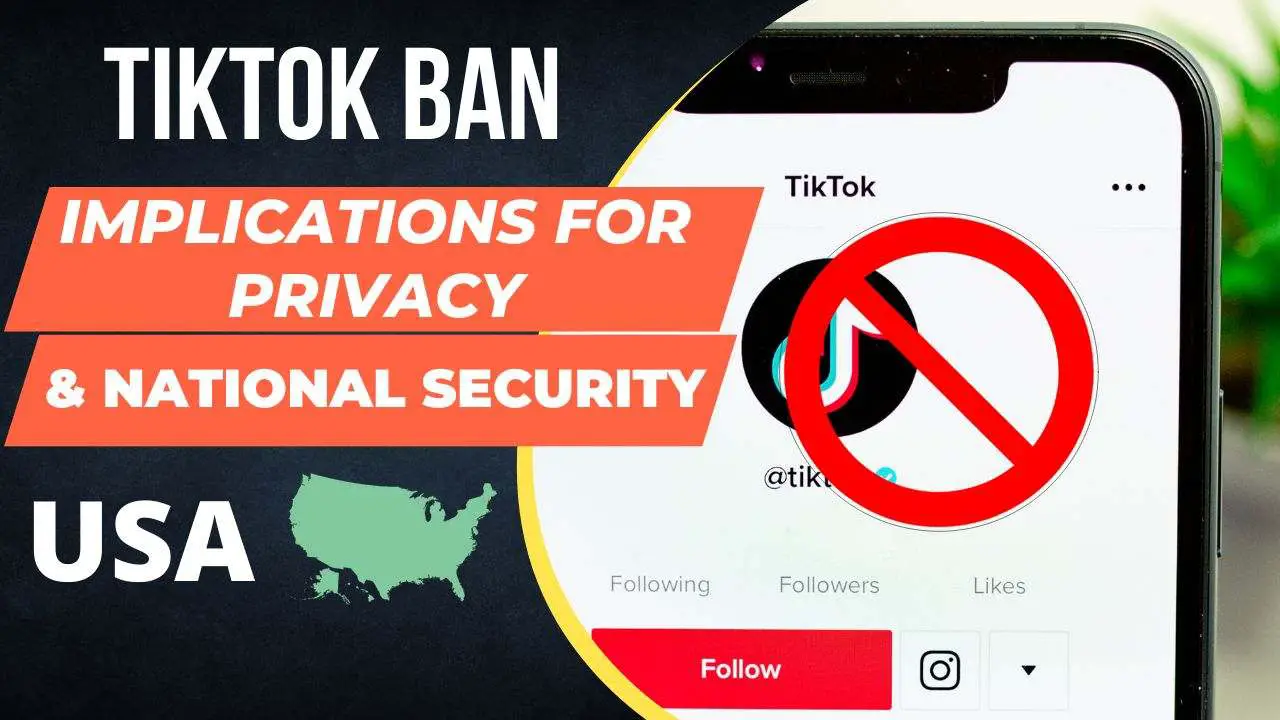Tiktok Ban In USA - Implications for Privacy & National Security
Tiktok Ban In USA - Implications for Privacy & National Security
This article discusses the possible ways that a TikTok ban could be implemented in the United States. On the direction the US government may take moving ahead, there is still not a clear agreement, but lawmakers are sounding alarms and proposing various proposals to ban TikTok. There are many ways that a TikTok ban could be implemented, including through an executive order, app stores being prevented from distributing the app, or virtual private networks being used to access the app.
Concerns include Chinese companies potentially using user data for tracking and disinformation efforts, as well as the possibility of handing over private data to the Chinese government.
Despite this concern, U.S. legislators are pushing for a total ban on the app. Several countries have planned to ban the app, but there is no agreement on the appropriate action to take. The rise of privacy and cybersecurity concerns is sounding alarms among lawmakers, as TikTok is one of the most popular video-sharing apps in the world.
Personal devices are not the only ones affected by TikTok, as governments are now banning it from official government devices too. UK, Canada, and Australia have all enacted bans on the app for their government devices, while U.S. lawmakers are sounding more alarms than ever before.

Why the TikTok ban is being considered and the potential implications?
The US government is considering a TikTok ban over security and Chinese government influence concerns. TikTok is owned by ByteDance, which has been accused of sharing user data with the Chinese government and censoring critical content.
If the ban is implemented, it could have significant implications for both TikTok and its users. For TikTok, the ban could result in the loss of revenue and market share, as well as having to lay off employees. For users, the ban would mean losing access to a popular source of entertainment and socialization. Furthermore, the TikTok ban could be perceived as a form of government censorship and restriction on the availability of information.
The ban could have potential benefits, such as safeguarding the privacy and security of American citizens, curbing political propaganda and misinformation, and encouraging competition among other social media platforms.
Overall, the TikTok ban is a complex issue with potential benefits and consequences. The US government should weigh the implications of the ban before taking any action & this way the ban could also impact the relationship between the US and China, which could have economic and political implications beyond just TikTok.
Furthermore, the ban could establish a model for other nations to emulate, potentially resulting in a more divided worldwide web. Ultimately, the decision to ban TikTok will need to balance the potential risks and benefits, and consider the impact on both individuals and society as a whole.
TikTok Restrictions Sweep Across US Public Universities and Government Devices
More than half of public universities in the United States have now restricted access to TikTok on school-owned devices, and in some cases, the app has been outright banned. The United States government has also prohibited government-issued devices from accessing the popular video-sharing app. In addition, many governments have prohibited states from downloading the app on their own devices or networks. As a result, campus Wi-Fi networks are also restricting access to TikToks and other social media platforms.
This is a way of circumventing the nationwide TikTok ban. VPNS are being used to access TikToks and its Chinese owner ByteDance, who has been accused of using user data to drive misinformation efforts and turn fans against certain Republican lawmakers. VPNs can shield users from having their browsing history and location traced by the app, along with any other malicious activities that might be taking place. While this provides access to the app, it could potentially leave users vulnerable to malware or cyber attacks from other countries.
U.S. Lawmakers Grapple with Privacy Concerns and Potential Chinese Government Access to TikTok User Data
The Chinese government could also require companies such as ByteDance, which owns TikTok, to hand over private user data. This has been a major concern for many U.S politicians since the Chinese government passed a law that requires any company with significant relationships with the Chinese government to hand over user data upon request.
To safeguard their users from privacy concerns and cyber-attacks, a few Americans. lawmakers have proposed selling TikTok’s Chinese owners’ shares or forcing them out of their ownership entirely. Others have suggested requiring the parent company, ByteDance, to restructure its relationship with the Chinese government and install an American CEO to monitor user data privacy and security more closely.
No matter what action is taken, it is clear that something needs to be done in order to protect American users from potential cyber-attacks or manipulation by China-based companies like ByteDance.
U.S. Legislators Push for Ban on TikTok and Other Chinese-Owned Apps Over National Security Concerns
U.S. legislators have been putting forward arguments for a ban on apps like TikTok, citing concerns about the relationship between ByteDance and the Chinese government, privacy, and national security. These fears are long-running; President Trump even threatened to ban TikTok before he left office.
Now that the Biden administration has stiffened its posture against China, legislators are endorsing a bipartisan bill that would effectively ban apps like TikTok and other Chinese-owned platforms due to their communist attitudes. With this bill in place, it is likely that apps like TikTok will face possible bans if they fail to adhere to U.S. regulations regarding data privacy and national security.
Proposed TikTok Ban Sparks Controversy and Calls for Greater Oversight of Social Media Platforms
A TikTok ban would impact 150+ million Americans and the tech industry, pushing the Biden administration to address similar data-sharing apps. It has sparked outrage and criticism from civil liberties groups over First Amendment violations.
In response, TikTok CEO Shou Chew has urged Congress to take action, saying that "a sale or any other action will not solve the underlying issues". He also advocated for bipartisan legislation which would allow for greater oversight of all apps, rather than just banning one app. 57% of Americans favor the federal government's move to ban TikTok, while 29% are against it, according to a recent survey.
Though there is still a divide on the effectiveness of the government's decision, there is a general consensus that Congress should establish regulations for social media platforms to manage user data, instead of only banning them.
India Ban TikTok Amidst National Security Concerns, Chinese Government Spying, and Border Clash
India banned TikTok in June 2020 following a violent border clash. The Parliament then followed suit and passed legislation prohibiting the app as well. The Ministry of Information and Broadcasting also warned against using TikTok, saying it could be a security risk. President Biden signed a bill banning federal government employees from using the TikTok app on their phones due to allegations of the Chinese government spying on US citizens.
The Trump administration had previously tried to ban TikTok from downloading in the US, using an executive order. This ban has caused a ripple effect around the world, with India following suit in 2020 and denying its citizens the ability to use TikToks. The Trump administration issued an executive order prohibiting any transactions between US companies and TikTok, thus barring cloud providers from providing internet infrastructure services for it. Tech policy experts cautioned that complying with this executive order could become a requirement for internet service providers seeking to maintain business relationships with the US government.
Pros and Cons of the TikTok Ban
Pros
- Privacy and Security: The US government sees TikTok as a threat to its citizens' privacy and security.
- National Security: The US government is concerned about Chinese spying through TikTok.
- Market Competition: The ban could create opportunities for other social media platforms to enter the US market.
- Intellectual Property: Some US companies have accused TikTok of infringing on their intellectual property rights, and the ban could protect them legally.
- Political Influence: TikTok has been accused of promoting political propaganda and spreading misinformation, and the ban could prevent such influence.
Cons:
- Revenue Loss: The proposed TikTok ban in the US could cause significant financial losses for the company and its creators, given its massive American user base.
- Censorship Concerns: The proposed ban raises concerns about censorship and access to information, with critics warning against government control of social media platforms and proponents advocating for national security and privacy protection.
- User Experience: TikTok has become a popular source of entertainment and socialization, and the ban would prevent American users from accessing its content.
- International Relations: The ban could negatively impact the US-China relationship, potentially affecting both nations.
- Job Losses: The ban could result in job losses for TikTok employees in the US, with potential impacts on the wider economy.
- Mental Health Impact: The ban may adversely affect some users' mental health and well-being, as TikTok provides a sense of community and entertainment that may not be easily found elsewhere.
Conclusion
In conclusion, the potential TikTok ban in the US has sparked concerns over privacy and national security. Americans must be aware of the potential risks of using the app, despite the ban not yet being enforced. It is recommended that Americans exercise caution while using TikTok and other Chinese-owned apps and be mindful of the data they share.
The US government must safeguard citizens' privacy and security and protect American businesses from negative effects. The TikTok ban prompts questions about data privacy and technology's role, which individuals and policymakers must address.





